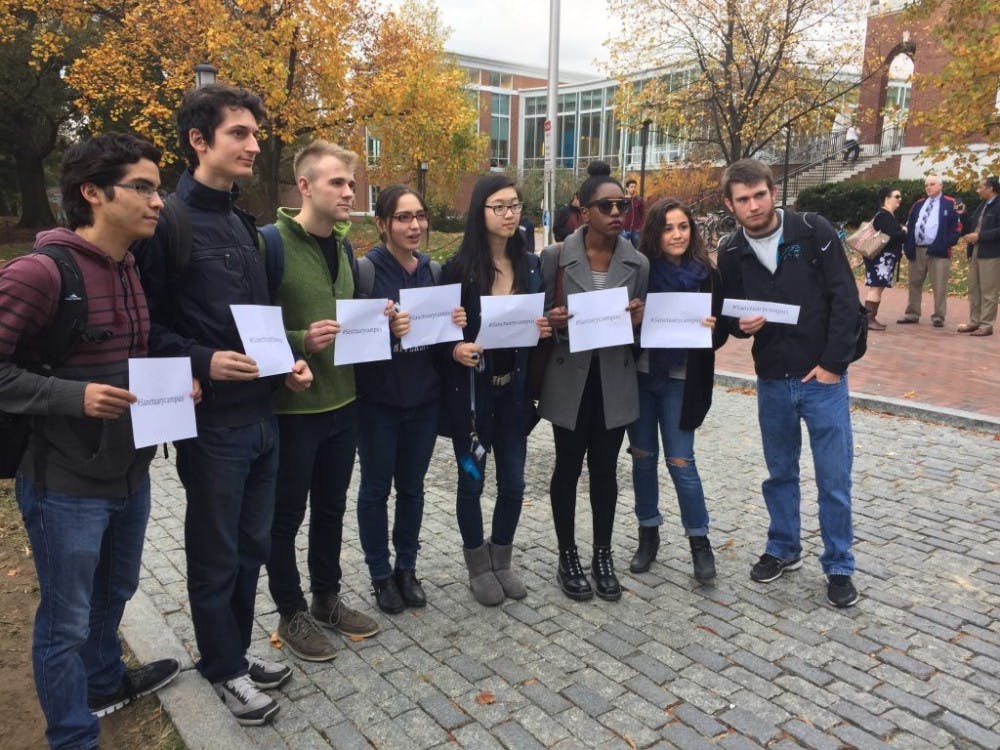Students walked out of class on Wednesday at 3 p.m. to show support for the national Sanctuary Campus movement. The campaign aims to protect undocumented immigrants on college campuses.
Around 100 undergraduate and graduate students, along with faculty, gathered on the Beach where they held up signs reading “#SanctuaryCampus.”
On Tuesday, Students for a Democratic Society (SDS) released an online petition titled “Protect Undocumented Affiliates,” which urges the administration to enact “sanctuary campus” status for Homewood.
This would prevent Immigration and Customs Enforcement (ICE) officers from entering campus and identifying undocumented immigrants. The petition had 802 signatures as of press time.
According to the web site for Movimiento Cosecha, the activist group that spearheaded the Sanctuary Campus movement, its purpose is “to create a massive resistance against Donald Trump and to demand permanent protection, dignity and respect for all immigrants.”
Ben Peak, a graduate student and an organizer of the event, gave opening remarks outlining the goal of the walk-out.
“Hopkins needs to be a safe spot for everyone on this campus. It needs to be known that we protect our students, no matter what their race, no matter what their color, no matter what their sexual orientation,” he said. “We need to be a shining example for the rest of this state and the rest of this country. That’s what we need this University and this administration to understand.”
Eric Bulakites, another graduate student and organizer of the event, argued that the administration needs to reiterate that it is a safe community for all students, especially for those who are marginalized.
“The University has made it very clear that
they respect all political views,” he said. “But they have to make it clear that they don’t respect hate speech, they don’t respect bigotry, and we will not let any students get deported from this campus if it comes down to that.”
In an email from Vice Dean of the Krieger School of Arts and Sciences (KSAS) Joel Schildbach to faculty, Schildbach wrote that teachers are not required to make adjustments to their lessons for the walk-out.
“Some students may be planning to participate in a walk-out from classes scheduled for 3 p.m. this afternoon,” he wrote. “I also write to state that should any of your students participate, you are not obligated to make accommodations for missed lectures, exams or assignments. Their participation is their choice. It is entirely your choice how, and whether, to accommodate.”
Graduate student Katherine Boyce-Jacino expressed outrage by this message.
“It’s pretty scathing. It’s pretty f*cked up,” Boyce-Jacino said. “Basically, it’s telling you that [faculty] can fail [students] if [they] want.”
Earlier in the week, organizers posted fliers around campus calling for a walk-out. However, the event was loosely organized, causing confusion about whether or not it would actually occur. Bulakites described the impromptu efforts of students to ensure the survival of the event.
“At Hopkins, there was some resistance towards doing [a walk-out]. I’m in the German and Romance Languages and Literature department and we decided we’d do it. We walked out,” Bulakites said. “It was really last minute, we grabbed as many people as we could on the way out.”
He went on to describe how it was challenging to get undergraduates to participate.
“I’m hoping it spurs the student body to do something and to care. I mean, we just went to the library to try to get people to come out for five minutes. No one went,” Bulakites said. “It needs to spur the student body before we can get the administration to do something, because it’s mostly graduate students out here. We need our undergrads.”
Senior Tarini Konchady challenged the perceived political indifference of Hopkins students.
“Ever since the election, I’ve just been motivated to come out and be a part of something, because I feel that political apathy is a large part of this mess. I understand that the Obama administration has done mass deportations, and I am ashamed that I didn’t wake up to this sooner,” she said. “But it’s better late than never, and that is why I’m here. Hopkins has a right to protect — a duty — to protect all of its affiliates, and those affiliates have the right to know that they’re safe here on the Hopkins campus.”
Assistant Provost of International Students and Scholar Services James Brailer spoke about current University measures in place to protect international and immigrant students, specifically in regards to immigration legislation by Congress.
“Our office always monitors for any rulemaking that comes along, we read the proposed regulations and as all other universities across the country have and take an opportunity to comment on the proposed regulation changes,” he said. “Then the agencies take all of those comments sift through, and typically the proposed legislation is modified in some way based on the comments of all the stakeholders.”
Brailer emphasized how changes in immigration law come about slowly because of all of the bureaucratic processes in place.
“What we’d like to assure all international students about is that change comes very slowly,” Brailer said. “It takes a lot to change the rules in the country.”
Junior Adriano Zarzur, an international student from Brazil, spoke about his own personal worries and also about the general concerns of immigrants.
“[Trump’s victory] has made my job search harder. President Trump’s policies on work-visas have been remarkably blurred. Consequently, HR departments have become understandably reluctant to hire foreigners,” he wrote in an email to The News-Letter. “But other foreigners who were already marginalized may now be more likely to face hate crimes and explicit racism. This puts an additional load on people who already face the problem of adapting to a culture other than their own.”
Rollin Hu contributed reporting.





